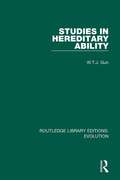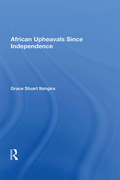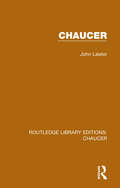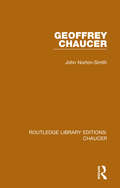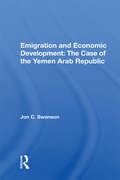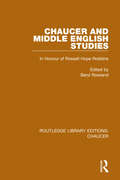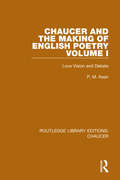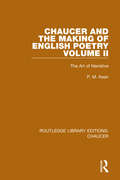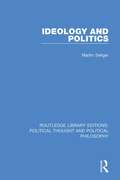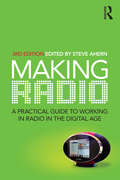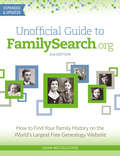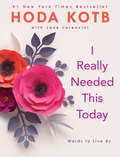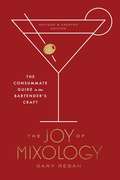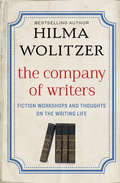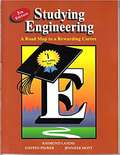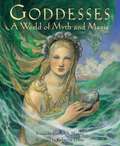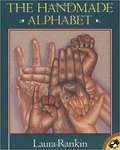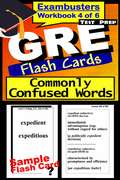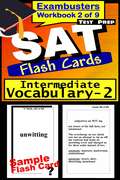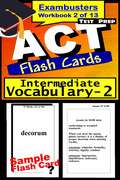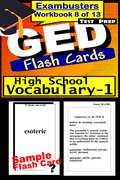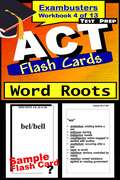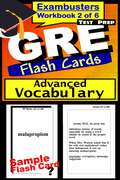- Table View
- List View
Studies in Hereditary Ability (Routledge Library Editions: Evolution #4)
by W.T.J. GunOriginally published in 1928, Studies in Hereditary Ability studies the genealogy of great families of Britain and America and examines how their ancestors influenced their genetics and who they subsequently ended up becoming. The book examines the descent of ability through both maternal and paternal lines, and seeks to argue that from both sides, there stems an equal chance of inheritance. At the time of publication maternal genealogy was relatively unexplored and the book examines the influence of the maternal line on hereditary genetics, as well as the early influence of the mother on a child’s environment. The book also examines the links between leadership and intelligence, and maps the genealogy of writers, scientists and artists, and proposes that these notable figures were more likely to have had notable relatives. Although very much of its time, the book will provide a unique and interesting read for social historians, anthropologists and genealogists alike.
African Upheavals Since Independence
by Grace Stuart IbingiraGrace Ibingira seeks the fundamental causes of the widespread upheavals (at least thirty-eight army coups in the past fifteen years) in African states today and finds them in the inadequate colonial preparation of African leaders for the responsibilities of independence, the earlier practices of "divide and raie, and the "winner-take-all policies o
Chaucer (Routledge Library Editions: Chaucer)
by John LawlorOriginally published in 1968. A critical interpretation of Chaucer's narrative poetry which concentrates on three major groupings - the early love-visions, the ‘tragedye’ of Troilus and Criseyde, and the Canterbury Tales. Emphasis is laid on Chaucer as an oral narrator and on the varying skills which this role encourages and sustains. The quotations are liberal and throughout help is given to the reader unfamiliar with Middle English.
Geoffrey Chaucer (Routledge Library Editions: Chaucer)
by John Norton-SmithOriginally published in 1974. This book discusses those aspects of Chaucer’s art which are concerned with the problem of specific form. These aspects have been concentrated on by the author for Chaucer’s major poems and some of his so-called minor poems in separate chapters. It offers a critical evaluation of some specific literary achievements of one of the most important authors of the medieval period. The author extensively compares Chaucer's poetic technique to contemporary French poets and preceding poetic structure.
Emigration And Economic Development: The Case Of The Yemen Arab Republic
by Jon C. SwansonAlthough social scientists tend to agree that emigration improves the standard of living of migrants and their families, research suggests that more generally it has a neutral or even negative effect on economic development in the home country. The Yemen Arab Republic is a case in point: while living standards there have improved with emigration, t
Chaucer and Middle English Studies: In Honour of Rossell Hope Robbins (Routledge Library Editions: Chaucer)
by Beryl RowlandOriginally published in 1974. The thirty-six essays of this book were written and assembled in hour of an internationally recognised scholar of medieval literature. Written by a diverse range of contributors, the chapters cover not only various studies of aspects of Chaucer’s poetry, but also some other medieval authors and investigations about the period, particularly referencing carols and hymns.
Chaucer and the Making of English Poetry, Volume 1: Love Vision and Debate (Routledge Library Editions: Chaucer)
by P. M. KeanOriginally published in 1972. This important work of Chaucerian scholarship deals with two aspects of the poet and his work - his individual achievement and his place in history - and demonstrates that in both these senses Chaucer is a maker of English poetry. The author assesses the extent of Chaucer’s debt to the English tradition. She considers the development of his ‘urbane’ manner as a new poetic technique and, with reference to such poems as the Parlement of Foules and the House of Fame, discusses new themes in the Love Vision. She concludes with a detailed study of Chaucer’s great debate on love Troilus and Criseyde.
Chaucer and the Making of English Poetry, Volume 2: The Art of Narrative (Routledge Library Editions: Chaucer)
by P. M. KeanOriginally published in 1972. This important work of Chaucerian scholarship deals with two aspects of the poet and his work - his individual achievement and his place in history - and demonstrates that in both these senses Chaucer is a maker of English poetry. The author explores Chaucer’s narrative art. The book includes an examination of the puzzling question of narrative structure in the Canterbury Tales and of the nature of Chaucerian comedy in these works. The author surveys the major themes of the poems: Fortune and free will, marriage, and the nobleness of man. In the final chapter she treats of the meaning of Chaucer’s art for his successors. Throughout the work, Miss Kean deals extensively with the sources which Chaucer used for the writing of his poems, in a way which directs light on the more difficult aspects of his art.
Ideology and Politics (Routledge Library Editions: Political Thought and Political Philosophy #52)
by Martin SeligerFirst published in 1976. Ideology plays an important role in many fields of human activity and has therefore been dealt with directly and indirectly in a vast number of studies, but a generally accepted definition of the term is lacking even in the various branches of social and political science. This book - the first since Mannheim to elaborate a comprehensive theory of ideology - seeks to offer a generally applicable definition, a task which of necessity involves taking issue with the logical and political implications of the conceptions in current use and which touches on central problems of politics and political science. Professor Seliger's theory is based on an approach and conceptualizations which will appeal both to ’traditionalists’ and 'behaviourists' since he gives due weight to both kinds of literature. Indeed, this book reflects throughout a detachment and independence of thought which are refreshing and opens up the way for both theorists and practising politicians to re-examine ideological tenets in the light of actual and feasible policy orientations and embark upon ideological reconstruction.
Making Radio: A practical guide to working in radio in the digital age
by Steve Ahern'The distilled wisdom and passion of top practitioners makes this an invaluable guide to making radio in Australia.' - Siobhan McHugh, award-winning radio feature producer and lecturer, University of Wollongong'a very useful hands-on guide to radio production in Australia' - Gail Phillips, Associate Professor of Journalism, Murdoch University'Making Radio has been a core text for all our radio courses since it was written. It covers everything form the basics you need to know when you begin your radio career, to high level skills required for career advancement.' - Kim Becherand, AFTRS Radio DivisionMaking radio programs gets into your blood: it's one of the most stimulating jobs in the world, in a fast-moving industry, at the cutting edge of digital technology.Making Radio is a practical guide for anyone who wants to learn how to make good radio in the era of Radio 2.0. It examines the key roles in radio: announcing, presenting, research, copywriting, producing, marketing and promotions. It also outlines what is involved in creating different types of radio programs: news and current affairs, music, talkback, comedy and WC features, as well as legal and regulatory constraints.With contributions from industry experts, the third edition reflects the impact of digital radio, including multi-platform delivery, listener databases, social media and online marketing. It also examines how radio stations have reinvented their business models to accommodate the rapid changes in communications and listener expectations.
200 under 20g Net Carbs: 200 Keto Diet–Friendly Recipes to Keep You under 20g Net Carbs Every Day!
by Lindsay BoyersMaintaining ketosis is simple and easy with these 200 recipes that are all under 20 grams of net carbs—making going (and staying) keto easier than ever! Let&’s face it, staying on track with the keto diet can be a challenge. But now your search for the perfect keto-friendly recipes to help you keep track of your daily macros and carbohydrate goals is over! With 200 under 20g Net Carbs there is no guess work, no endless research, and no confusion. It includes all the delicious recipes you need to meet your goals—simply use the daily meal plans or mix-and-match your favorite recipes to keep track of your daily net carbs. These 200 tasty, keto-friendly recipes are all under 20 grams of net carbs so you know you&’re never going above your daily limit again! If you&’re trying to stay strictly at 20 grams of net carbs, you can pick one of the daily meal plans to give you some guidance. If you need more variety, swap in your favorite recipes to create the perfect meal plan that works for you. And if you&’re just looking for some low-carb recipes but aren&’t limiting your diet to 20 grams of net carbs, this is a great place to start! With detailed nutrition stats, you&’ll have all the information you need to make the keto diet work for you. Choose a recipe (or two) and get cooking!
Unofficial Guide to FamilySearch.org: How to Find Your Family History on the World's Largest Free Genealogy Website
by Dana McCulloughMaster the #1 Free Genealogy Website!Discover your ancestry on FamilySearch.org, the world's largest free genealogy website. This in-depth user guide shows you how to find your family in the site's databases of more than 3.5 billion names and millions of digitized historical records spanning the globe. Learn how to maximize all of FamilySearch.org's research tools--including hard-to-find features--to extend your family tree in America and the old country.In this book, you'll find: • Step-by-step strategies to craft search queries that find ancestors fast • Practical pointers for locating your ancestors in record collections that aren't searchable • Detailed overviews of FamilySearch.org's major U.S. collections, with helpful record explanations to inform your research • Guidance for using FamilySearch.org's vast record collections from Europe, Canada, Mexico and 100-plus countries around the world • Tips for creating and managing your family tree on FamilySearch.org • Secrets to utilizing user-submitted genealogies, 200,000 digitized family history books, and the FamilySearch catalog of 2.4 million offline resources you can borrow through a local FamilySearch Center • Worksheets and checklists to track your research progress Illustrated step-by-step examples teach you exactly how to apply these tips and techniques to your own research. Whether you're new to FamilySearch.org or you're a longtime user, you'll find the guidance you need to discover your ancestors and make the most of the site's valuable resources.
I Really Needed This Today: Words to Live By
by Hoda KotbFrom New York Times bestselling author and beloved Today show co-host Hoda Kotb comes an inspiring collection of quotes--drawn from her own personal favorites featured on her enormously popular Instagram account--that offer wisdom, courage, and hope.Several years ago, Today show co-host Hoda Kotb began posting a variety of quotes on her Instagram page. Some were penned by a favorite writer; others offered a dose of love or laughter. She thought the quotes were meaningful only to her, but soon a funny thing started happening - reactions poured in from thousands of people who were just as moved. The quotes weren't only providing inspiration to Hoda, they were comforting and connecting people. So many of their comments read, "I really needed this today," a phrase that inspired the book's title. In I Really Needed This Today, Hoda not only shares 365 sayings and quotes, she writes about the people and experiences that have pushed her to challenge boundaries, embrace change, and explore relationships to their fullest. Written with her signature wit and warmth, this book is the ideal companion to tuck beside your bed or to bring with you on-the-go to keep you motivated, recharged, and inspired each day.
Discovering Our Past: Reading Essentials & Study Guide
by McGraw-Hill EducationNIMAC-sourced textbook
The Joy of Mixology, Revised and Updated Edition: The Consummate Guide to the Bartender's Craft
by Gary ReganA thoroughly updated edition of the 2003 classic that home and professional bartenders alike refer to as their cocktail bible. Gary Regan, the "most-read cocktail expert around" (Imbibe), has revised his original tome for the 15th anniversary with new material: many more cocktail recipes--including smart revisions to the originals--and fascinating information on the drink making revival that has popped up in the past decade, confirming once again that this is the only cocktail reference you need.A prolific writer on all things cocktails, Gary Regan and his books have been a huge influence on mixologists and bartenders in America. This brand-new edition fills in the gaps since the book first published, incorporating Regan's special insight on the cocktail revolution from 2000 to the present and a complete overhaul of the recipe section. With Regan's renowned system for categorizing drinks helps bartenders not only to remember drink recipes but also to invent their own, The Joy of Mixology, Revised and Updated Edition is the original drinks book for both professionals and amateurs alike.
The Company of Writers: Fiction Workshops and Thoughts on the Writing Life
by Hilma WolitzerAward-winning author Hilma Wolitzer's expert guide to navigating a life of writing through workshops and writers' groupsWhen Hilma Wolitzer finished writing her first short story, she had no idea what to do next. She didn't trust her family members to give honest critiques, and most of her friends--though they tried to be helpful--knew little about writing fiction. But her creative life changed when she attended a local writing workshop and discovered the joys of working within an artistic community. Since good workshops and conferences are often expensive or difficult to find, Wolitzer provides a guide to building a workshop of your own. With dedication and drive, an informal writer's group can become as useful as any college course--and much more fun. Wolitzer shows how to build a group, how to make it effective, and how to keep going when a member hits a snag. She also offers solid advice on many aspects of writing and publishing fiction. Writing may be a solitary occupation, but in the company of writers, it never needs to be lonely. This ebook features an illustrated biography of Hilma Wolitzer, including rare photos and never-before-seen documents from the author's personal collection.
Studying Engineering: A Road Map to a Rewarding Career
by Raymond B. Landis Jennifer Mott Steffen PeukerSince Studying Engineering: A Road Map to a Rewarding Career exploded onto the market in 1995, it has become the best selling Introduction to Engineering textbook of all time. Adopted by over 300 U.S. institutions, and reaching more than 150,000 students, the book has made major inroads into the "sink or swim" paradigm of engineering education. Armed with the book as a powerful tool for "student development," large numbers of engineering programs have implemented Introduction to Engineering courses to improve the academic performance and retention rates of their students.
Goddesses: A World of Myth and Magic
by Burleigh MutenFor many thousands of years, stories of goddesses have inspired women and girls from all over the world. Now, the strength and power of these divine women has been collected into one breathtaking volume, featuring fascinating descriptions by goddess expert Burleigh Muten of over one hundred of the world's most celebrated goddesses. With stunning classical artwork by Rebecca Guay, the entries and images in Goddesses come together to form a powerful mirror that illuminates the most radiant and complex aspects of womankind, helping to redefine what it is to be feminine. A perfect gift for mothers, daughters, best friends, and for anyone looking for personal empowerment in book volume will open girls and women to their true potential and help release the goddess energy that is latent in every one of them.
The Handmade Alphabet
by Laura RankinHand signs for the various letters of the alphabet are depicted in this book.
GRE Test Prep Flash Cards: Commonly Confused Words (Exambusters GRE Workbook #4 of 6)
by Ace Inc.<P><P><i>Advisory: Bookshare has learned that this book offers only partial accessibility. We have kept it in the collection because it is useful for some of our members. Benetech is actively working on projects to improve accessibility issues such as these.</i> <P><P>Do you know the difference between "fewer" and "less," when to use "it's" or "its," or how to distinguish between "historical" and "historic" or "tortuous" and "torturous?" <P><P>This course contains 500 pairs of commonly confused words, some so frequently misused that their wrong application has become acceptable to many ears. Includes part of speech, pronunciation, simple definition, and usage example. Mastering the differences will improve your written grammar, verbal communication, and most importantly, your GRE-General test score! <P>EXAMBUSTERS GRE Prep Workbooks" provide comprehensive, fundamental GRE review--one fact at a time--to prepare students to take practice GRE tests. Each GRE study guide focuses on one specific subject area covered on the GRE exam. From 300 to 600 questions and answers, each volume in the GRE series is a quick and easy, focused read. Reviewing GRE flash cards is the first step toward more confident GRE preparation and ultimately, higher GRE exam scores!
SAT Test Prep Flash Cards: Intermediate Vocabulary (Exambusters SAT Workbook #2 of 9)
by Ace Inc.<P><P><i>Advisory: Bookshare has learned that this book offers only partial accessibility. We have kept it in the collection because it is useful for some of our members. Benetech is actively working on projects to improve accessibility issues such as these.</i><P><P> "SAT Prep Flashcard Workbook 2: VOCABULARY-Intermediate" 500 frequently tested SAT words every high school student should know. Perfect for anyone who wants to enrich their vocabulary! Improve your reading comprehension and conversation. Includes sample sentence, part of speech, pronunciation, succinct, easy-to-remember definition, and common synonyms and antonyms. <P> EXAMBUSTERS SAT Prep Workbooks provide comprehensive, fundamental SAT review--one fact at a time--to prepare students to take practice SAT tests. Each SAT study guide focuses on one specific subject area covered on the SAT exam. From 300 to 600 questions and answers, each volume in the SAT series is a quick and easy, focused read. Reviewing SAT flash cards is the first step toward more confident SAT preparation and ultimately, higher SAT exam scores!
ACT Test Prep Flash Cards: Intermediate Vocabulary (Exambusters ACT Workbook #2 of 13)
by Ace Inc.<P><P><i>Advisory: Bookshare has learned that this book offers only partial accessibility. We have kept it in the collection because it is useful for some of our members. Benetech is actively working on projects to improve accessibility issues such as these.</i><P><P> 500 frequently tested ACT words every high school student should know. <P><P>Perfect for anyone who wants to enrich their vocabulary! Improve your reading comprehension and conversation. Includes sample sentence, part of speech, pronunciation, succinct, easy-to-remember definition, and common synonyms and antonyms.
GED Test Prep Flash Cards: High School Vocabulary 1 (Exambusters GED Workbook #8 of 13)
by Ace Inc.<P><P><i>Advisory: Bookshare has learned that this book offers only partial accessibility. We have kept it in the collection because it is useful for some of our members. Benetech is actively working on projects to improve accessibility issues such as these.</i><P><P> 500 words every high school student should know. Includes sample sentence, part of speech, pronunciation, succinct, easy-to-remember definition, and common synonyms and antonyms. <P><P> EXAMBUSTERS GED Prep Workbooks provide comprehensive, fundamental GED review--one fact at a time--to prepare students to take practice GED tests. Each GED study guide focuses on one specific subject area covered on the GED exam. From 300 to 600 questions and answers, each volume in the GED series is a quick and easy, focused read. Reviewing GED flash cards is the first step toward more confident GED preparation and ultimately, higher GED exam scores!
ACT Test Prep Flash Cards: Word Roots (Exambusters ACT Workbook #4 of 13)
by Ace Inc.<P><P><i>Advisory: Bookshare has learned that this book offers only partial accessibility. We have kept it in the collection because it is useful for some of our members. Benetech is actively working on projects to improve accessibility issues such as these.</i><P><P> A unique collection of 380 essential Word Roots, Prefixes, and Suffixes, each with up to ten derivative word examples and definitions.<P><P>Interpret new words without a dictionary. You'll view language from an entirely new perspective, and raise your ACT test score too!
GRE Test Prep Flash Cards: Advanced Vocabulary (Exambusters GRE Workbook #2 of 6)
by Ace Academics Inc.350 words every well-educated person should know. While you may not hear them every day, they can show up on the GRE-General test, and understanding them will boost your score. <P><P>Includes sample sentence, part of speech, pronunciation, succinct, easy-to-remember definition, and common synonyms and antonyms.<P> <P>EXAMBUSTERS GRE Prep Workbooks" provide comprehensive, fundamental GRE review--one fact at a time--to prepare students to take practice GRE tests. Each GRE study guide focuses on one specific subject area covered on the GRE exam. From 300 to 600 questions and answers, each volume in the GRE series is a quick and easy, focused read. Reviewing GRE flash cards is the first step toward more confident GRE preparation and ultimately, higher GRE exam scores! <p> <i>Advisory: Bookshare has learned that this book offers only partial accessibility. We have kept it in the collection because it is useful for some of our members. To explore further access options with us, please contact us through the Book Quality link. Benetech is actively working on projects to improve accessibility issues such as these.</i>
